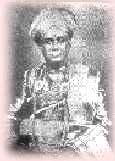Tribute
GAYAKASIKHAMANI HARIKESANALLUR MUTHAIAH BHAGAVATAR
Carnatica pays tribute to this great personality on his 123rd Birth Anniversary

Made his debut at Tuticorin at the age of seventeen and was presented with a Tambura. He quickly shot into fame. Travancore State made the first demand on his service in 1987 and the ruler Moolam Tirunal made him Asthana Vidwan. His voice turned turtle and so musical discourse came to be his area of specialisation.
Muthaiah Bhagavatar was a composer of real eminence with four hundred pieces including 108 on Sri Chamundeshwari. He evolved new ragas like Hamsanandi, Vijayanagari, Paupatipriya, Budha Manohari, etc. He held Tyagaraja as his model and later became an ardent admirer of Muthuswami Dikshitar. His Todi varna is remarkable and his pieces are in Sanskrit, Tamil, Telugu and Kannada. His mudra is Harikesa.
Krishna Rajendra Wodeyar of Mysore honoured him with the title of “Gayaka Sikhamani” and made him his Asthana Vidwan. In 1924, Bhagavatar started a music-training centre at Madurai. At Trivandrum he was appointed as Principal of the Swati Tirunal Academy of Music and he wrote "Sangeeta Kalpadruma” a treatise on the science of music and was awarded a Doctorate in 1943 by the University of Travancore.
The respected Vidwan breathed his last at Mysore on June 30, 1945. He was grand in person and attire and lived grandly as a worthy composer, impressive teacher, keen debater and kind person. His life is a lesson for all who aspire to succeed. He was a rare phenomenon, a favorite of the masses whom he mesmerized with his pomp, pageantry, paraphernalia, puns and wizardry in music.